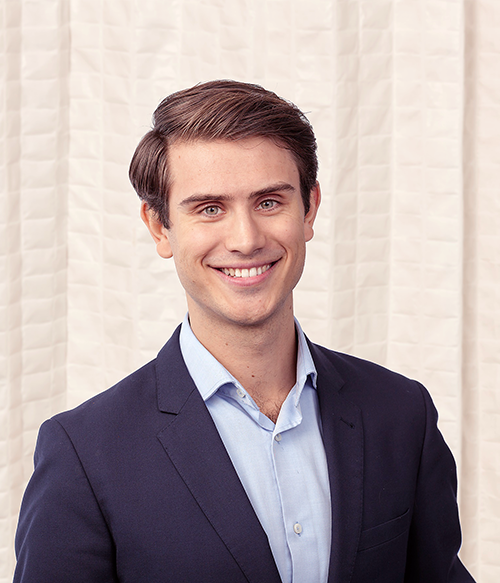Simon works with sustainable urban development and social sustainability
Simon Iaffa Nylén graduated from the master’s programme in Sustainable Urban Planning and Design in 2018. He now works as a Sustainability Manager at Brunswick Real Estate in Stockholm.

Hi Simon, what are you working on at the moment?
I currently work as a Sustainability Manager at Brunswick Real Estate – a market leading investor and lender in the Nordic region, with services including real estate investment and credit financing. In other words, we manage and develop commercial real estate around the Nordic region for private and institutional investors.
My duties as a Sustainability Manager are twofold – firstly to develop and integrate our sustainability strategy in all parts of the business, and secondly to develop and oversee different sustainability initiatives in one of our portfolios for commercial real estate in Swedish regional cities.
We are two employees at the company working with sustainability, and my focus is towards sustainable urban development and social sustainability, while my colleague works more with energy efficiency projects and ecological sustainability.
What can a regular day look like at your job?
This is an easy one – because there’s no such thing as a regular day in this role! One day can be spent at the desk doing an analysis of how to develop our properties in a more social sustainable way, writing policies, setting strategies or answering a ton of emails. While other days are spent in the field – in our properties – meeting our tenants, property managers, the municipality or with NGOs operating in the districts around our properties. One can also say that I’m a Collaborator Manager – meeting and working with a broad spectrum of actors from both the private and public sphere, to develop new ways of working and cooperate – which I believe are crucial to develop a more sustainable society. Working outside the traditional silos is my status quo.
Why did you choose this programme at KTH?
I decided to apply to the Sustainable Urban Planning and Design programme while doing an exchange semester at the University of Virginia in the US. It was part of my bachelor’s degree in Environmental Science at Lund University, and it was a class in Urban and Environmental Planning that sparked an interest in urban planning. We read about the environmental impacts cities have and what challenges face the cities of the future – especially in relation to the fact that 68% of the world population is projected to live in urban areas by 2050 – and I think that that challenge really got me, and I wanted to be a part of the solution.
Before leaving the US, I remember Googling master programmes in urban planning and found out that KTH:s Sustainable Urban Planning and Design programme offered just what I wanted – an approach to urban planning from an environmental point of view. That it was an international programme and welcomed students with different academic backgrounds was the icing on the cake!
Are there any insights or knowledge you acquired during your studies that have been particularly useful for you in your career?
First of all, that urban planning is a complex field of work. It requires being able to work and speak with all kind of actors, such as architects, consultants, municipal officers, politicians, tenants, NGOs, property managers and essentially all people interested in a specific development project. To really have a sustainable urban development – all voices should be consulted – and often, those voices that have not traditionally been heard in the urban planning process, are those with the best and most long-term sustainable ideas. These are the people and organizations I try to find and work with.
Secondly, the Sustainable Urban Planning and Design programme really prepared me to work with people from all kinds of backgrounds – both academically and ethnically – which I really reap the benefits of now. Both urban planning and sustainability are fields where people have a lot of different perspectives on, different truths on, and ways of working – depending on your academic background, political views, place of birth, etc. So being trained in how to manage these diverse perspectives, political views and academic backgrounds, and get them together to work towards the same goal – has been invaluable. So, bring all you got to the group projects – even if they will be challenging sometimes!
What were the best aspects of your studies at KTH?
The international atmosphere. I got to meet so many interesting people from all around the world during those two years at KTH, and I’m really grateful for that. Learning from others can be as valuable as learning from a professor (don’t tell them I said so!).
What is your best memory from your time at the university?
The examination for sure! No, but really, all projects that we did in collaboration with municipalities and companies were so much fun. The project becomes even more significant when someone on a payroll listens to your recommendations and plans.
What are your plans for the future?
To continue meeting and working with all kinds of people and organizations in order to develop and improve the world. There’s no planet B – that’s for sure.
What would you say to a student thinking of applying for this programme?
Stop thinking and start applying!
